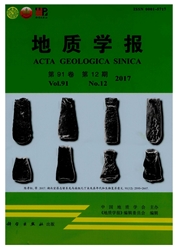

 中文摘要:
中文摘要:
本文对鄂尔多斯盆地镇泾区块上三叠统延长组长8油层组砂岩中绿泥石矿物的类型、赋存状态、形成时间、晶体化学特征及成因机制进行了较为系统的研究。结果表明研究区的绿泥石以铁镁绿泥石和铁斜绿泥石为主,包括陆源碎屑绿泥石、自生绿泥石和蚀变绿泥石3种,自生绿泥石又包括颗粒包膜、孔隙衬里和孔隙充填绿泥石3种,以孔隙衬里绿泥石为主,形成时间依次为:颗粒包膜绿泥石→孔隙衬里绿泥石→孔隙充填绿泥石,蚀变绿泥石的形成可贯穿于整个成岩阶段。不同类型绿泥石的晶体化学特征、分布规律和成因机制各异。陆源碎屑绿泥石是与碎屑颗粒一起搬运沉积的产物,主要分布于水动力较弱的沉积环境中,其Fe、Mg、Mn和AlⅣ含量最高,Si、Ca和AlⅥ含量最低。蚀变绿泥石具较高含量的Fe、Mg和AlⅣ,较低含量的Si、Ca和AlⅥ,因主要由富铁镁碎屑蚀变而来,分布与其具空间上的耦合性。自生绿泥石的Fe、Mg和AlⅣ含量最低,Si、Ca和AlⅥ含量最高,孔隙衬里绿泥石较孔隙充填绿泥石含较高含量的Fe和K及较低含量的Ca和Mg,且从碎屑颗粒边缘到孔隙中心方向其Fe、Mg、AlⅣ和六次配位阳离子总数逐渐增加,K、Si、AlⅥ含量逐渐减少。颗粒包膜和孔隙衬里绿泥石主要见于辫状河三角洲前缘水下分流河道和分流河口砂坝中,其所需铁镁物质由同沉积絮凝含铁镁沉积物溶解提供;孔隙充填绿泥石的分布受控于砂岩结构,砂岩粒度越粗、孔喉结构越好越有利于其发育,所需铁镁物质由泥岩压释水提供。
 英文摘要:
英文摘要:
The study of Chang 8 sandstones from the Upper Triassic Yanchang Formation in the Zhenjing area, Ordos Basin, was undertaken to unravel the characteristics of chlorite minerals, such as type, occurrence, formation time and origin and so on. The chlorite minerals in the Chang 8 sandstones present as three different occurrences: terrigenous clastic chlorite, authigenic chlorite and alteration chlorite. Among them, the authigenic chlorite occurs as grain-coatings, pore-linings and pore-fillings, with the pore-lining chlorite as the main type, and their formation sequence is grain-coatings→pore-linings→pore-fillings. The terrigenous clastic chlorite was synsedimentary product and alteration chlorite formed through all the period of diagenesis. Chlorites of different types are characterized by various crystal chemistry, distribution pattern, and mechanism. The terrigenous clastic chlorite, along with clastic grains, was the product of transportation, forming mainly in weakly dynamic sedimentary environment which contains highest contents of Fe, Mg, Mn and AlⅣ, and lowest contents of Si, Ca and AlⅥ. The alteration chlorite has higher Fe, Mg, AlⅣ, and less Si, Ca, AlⅥ due to the fact that it derived from the chloritization of Fe- and Mg-rich clastic fragments, and both have similar distribution patterns. The authigenic chlorite contains lowest Fe, Mg and AlⅣ, and highest Si, Ca and AlⅥ, with pore-lining chlorite containing higher Fe, K and lower Ca, Mg than pore-filling chlorite. The contents of Fe, Mg, AlⅣ from detrital grain edge to pore center and the total sum (VI)of cations gradually increase while the contents of K, Si and AlⅥ decrease. The grain-coating and pore-lining chlorites are distributed mainly in the subsea distributary channels and mouth bars, with the Fe and Mg materials deriving from the dissolution of flocculated, clay-like and Fe- and Mg-rich materials. The pore-filling chlorite is subject to the structures of sandstone: the coarser size and good pore throat structure are
 同期刊论文项目
同期刊论文项目
 同项目期刊论文
同项目期刊论文
 Sealing mechanism for cap beds of shallow biogenic gas pools in Late Quaternary deposits of the Qian
Sealing mechanism for cap beds of shallow biogenic gas pools in Late Quaternary deposits of the Qian Sedimentary characteristics and evolution for late Quaternary incised valley fills (the Qiantang Riv
Sedimentary characteristics and evolution for late Quaternary incised valley fills (the Qiantang Riv Exploration methods for late Quaternary shallow biogenic gas reservoirs in the Hangzhou Bay area, ea
Exploration methods for late Quaternary shallow biogenic gas reservoirs in the Hangzhou Bay area, ea 期刊信息
期刊信息
